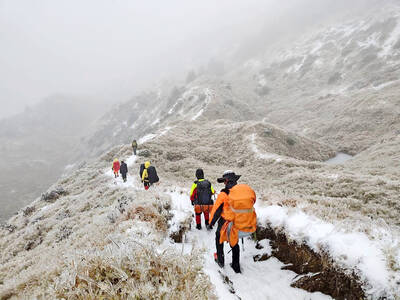Mainland Affairs Council Chairwoman Lai Shin-yuan (賴幸媛) yesterday said the council hoped the economic cooperation framework agreement (ECFA) that the government is looking to sign with Beijing would motivate neighboring countries to ink free trade agreements (FTAs) with Taiwan.
Emphasizing the planned pact would be “purely economic” in nature, Lai said it would not address political issues or sovereignty.
While a closer economic partnership arrangement signed between Hong Kong and Beijing made clear that the special arrangement was made under the “one country, two systems” principle, Lai said Taiwanese would never accept signing the ECFA under such a model.
Lai made the remarks while addressing the annual conference for Overseas Chinese in Europe at the Howard Hotel yesterday morning.
Lai told the audience that as Taiwan has an export-driven economy, signing an ECFA would only drive neighboring countries to want to sign FTAs with Taiwan.
“The ECFA will serve as a significant catalyst for Taiwan’s attempt to be part of the economic integration in the region,” she said.
Lai said any “elementary school student” would know that Taiwan would be in an unfavorable position if the country did not sign an ECFA with Beijing because ASEAN products would begin to enjoy zero tariffs when the ASEAN Plus One goes into effect in January.
“We are sorry to know that some people have doubts about the proposed pact,” she said. “Unlike FTAs signed between two countries or the North America Free Trade Agreement between the US, Canada and Mexico, the ECFA is a framework agreement and does not cover many areas.”
Lai said she hoped the ECFA would be signed as soon as possible. The planned agreement would cover investment guarantees and intellectual property rights, Lai said, adding it was hoped that a list of industries free from economic restrictions would be ready by next year.
Regarding cross-strait negotiations on political issues, Lai said the time was not right to tackle such issues because of the controversy they raise and differences on both sides.
Lai said President Ma Ying-jeou’s (馬英九) government has conducted studies on such issues as establishing military confidence building mechanisms and signing a peace agreement with Beijing, but both sides still needed to build trust.
“There is no timetable for political negotiations,” she said.
Ma has also set the preconditions for political talks, she said, adding that his proposal that Beijing must remove missiles targeting Taiwan is a public consensus.
Lai said that the government’s cross-strait policy would proceed gradually, adding that it would tackle easier and more urgent issues first and steadily move toward more difficult and less pressing ones. Economic issues would precede political ones, she said.
Any isolated case such as the visit of the Dalai Lama was unlikely to change the course of peaceful development in the Taiwan Strait, she said. While cross-strait issues have always been controversial and received much public attention as well as criticism, Lai said, the Ma government would proceed in a gradual and stable fashion.
It is true that some opposition parties do not see eye to eye with the administration’s China policy, but a responsible government will make efforts to effectively communicate with them, she added.

Trips for more than 100,000 international and domestic air travelers could be disrupted as China launches a military exercise around Taiwan today, Taiwan’s Civil Aviation Administration (CAA) said yesterday. The exercise could affect nearly 900 flights scheduled to enter the Taipei Flight Information Region (FIR) during the exercise window, it added. A notice issued by the Chinese Civil Aviation Administration showed there would be seven temporary zones around the Taiwan Strait which would be used for live-fire exercises, lasting from 8am to 6pm today. All aircraft are prohibited from entering during exercise, it says. Taipei FIR has 14 international air routes and

The Ministry of National Defense (MND) today released images of the military tracking China’s People's Liberation Army (PLA) movements during the latest round of Chinese drills around Taiwan. The PLA began "Justice Mission 2025" drills today, carrying out live-fire drills, simulated strikes on land and maritime targets, and exercises to blockade the nation's main ports. The exercises are to continue tomorrow, with the PLA announcing sea and air space restrictions for five zones around Taiwan for 10 hours starting from 8:30am. The ministry today released images showing a Chinese J-16 fighter jet tracked by a F-16V Block 20 jet and the

Snow fell on Yushan (Jade Mountain, 玉山) yesterday morning as a continental cold air mass sent temperatures below freezing on Taiwan’s tallest peak, the Central Weather Administration (CWA) said. Snowflakes were seen on Yushan’s north peak from 6:28am to 6:38am, but they did not fully cover the ground and no accumulation was recorded, the CWA said. As of 7:42am, the lowest temperature recorded across Taiwan was minus-5.5°C at Yushan’s Fengkou observatory and minus-4.7°C at the Yushan observatory, CWA data showed. On Hehuanshan (合歡山) in Nantou County, a low of 1.3°C was recorded at 6:39pm, when ice pellets fell at Songsyue Lodge (松雪樓), a

NO SHAME IN RETREAT: Hikers should consider turning back if the weather turns bad or if they do not have sufficient equipment, the Taroko park headquarters said Two people died of hypothermia over the weekend while hiking on Hsuehshan (雪山), prompting park authorities to remind hikers to bring proper equipment and consider their physical condition before setting out in the cold weather. Temperatures dropped over the weekend, bringing snow to high altitudes in Shei-pa National Park. One hiker, surnamed Lin (林), who on Friday was traveling with a group of six along the Hsuehshan west ridge trail, lost consciousness due to hypothermia and died, the Shei-pa National Park Headquarters said. On Saturday, another hiker, surnamed Tien (田), in a group of five on the southeast of the west